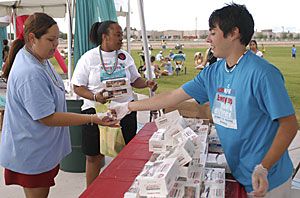 |
|
MATT ROBLES/Arizona Daily Wildcat
|
Joel Vigil, pre-business sophomore, volunteers at one of the many booths during the AIDS Walk yesterday morning at Rillito Downs.
|
|
|
By Mitra Taj
Arizona Daily Wildcat
Monday, October 18, 2004
Print this
Students concerned with the worldwide AIDS epidemic turned out to walk and run early Sunday morning at AIDS Walk 2004 to raise money for services for AIDS and HIV patients.
Students made up about 320 of the event's 400 volunteers, said Rick Wilson, director of development for the Southern Arizona AIDS Foundation, a non-profit organization that helps people infected with AIDS or HIV and promotes prevention education.
Wilson estimated the event, presented by Desert Diamond Casino and Safeway Pharmacy, drew more than 3,000 people to Rillito Downs.
Many students also walked four to five kilometers or ran 10 to 13 kilometers for money donated to SAAF, which will in turn use the money to provide case management and medical assistance for the more than 1,000 people in the Southern Arizona who have HIV or AIDS.
Molly Newburn, a first-year law student who participated in the 10-kilometer run representing the College of Law and the Law Women's association, said the domestic AIDS crisis needs to be put back in the national spotlight.
"Right now is a crucial time to raise awareness again," Newburn said. "AIDS is now taking a back burner to other issues."
Wilson said it's important that students and other young people be concerned with AIDS because, nationally, more than half of all new HIV infections are among people under 25.
"This is an ongoing threat in our community," Wilson said. "People need to be careful and aware of AIDS."
Wilson said Southern Arizona AIDS Foundation expected to raise $235,000 from the walk yesterday, $10,000 more than last year. The money is especially important, he said, because of the 10 to 20 percent increase in demand for SAAF's services amid a decrease in some federal funding.
Wilson called the high student participation in the AIDS Walk "remarkable" and said it shows young people's commitment to their community.
Eno Washington, 53, a former graduate student at the UA who will be teaching a course in African aesthetics next semester, has had AIDS for 18 years.
Washington left school last semester for medical leave.
 |
Right now is a crucial time to raise awareness again. AIDS is now taking a back burner to other issues.
– Molly Newburn, firs
-year law student
|
 |
"I'm so happy to see this day when people are no longer ashamed to talk about AIDS," Washington said.
A former Broadway dancer, Washington said he's seen "a whole generation" of people - dancers, gay men and black men - die of AIDS.
"I'm walking to honor many friends who've passed away and to let them know they're not forgotten," Washington said. "And also to warn people who may be infected in the future."
While parts of SAAF's educational programs teach abstinence, the group's advocacy of the use of condoms excludes SAAF from large abstinence-only federal grants the Bush administration has supported.
Anne Simmons, a journalism and political science senior who walked with a group sponsored by KUAT, said it's troubling that mostly older people, like politicians, are making decisions that primarily affect young people.
"By not properly educating them, they're doing a disservice to them," Simmons said.
Ryan Fagan, a media arts senior, said he thinks Vice President Dick Cheney's admission during the Oct. 5 vice presidential debate that he was unfamiliar with the disproportionate numbers of black women infected with AIDS was "telling" of many politicians' lack of interest in the AIDS crisis.
"A lot of people have the idea that AIDS is not that big a deal anymore," said Fagan. "But it's still a problem here and it needs more funding."
Kelley Brooks, an elementary education junior who, together with five members of the pro-choice club, Students for Choice, raised $900 for SAAF, said she walked for her uncle who died of AIDS 10 years ago.
Brooks said she doesn't think the government is doing enough to prevent more people like her uncle from dying. She said what's lacking is a commitment from politicians to follow through with their promises and fully fund AIDS and HIV related programs.
Simmons said events like the AIDS Walk get out the message and are a starting place for more political involvement.
The event drew a number of elected officials, including Mayor Bob Walkup, U.S. Reps. Jim Kolbe and Raul Grijalva, and City Councilman Fred Ronstadt.
Grijalva, who said he's been participating in the AIDS Walk for "a long time," said he's impressed by the way young people are dealing with the AIDS epidemic.
"They approach it as a health issue, as a humanitarian issue," Grijalva said. "They don't see the stigma attached to it. It's so healthy. The way to conquer this is through that attitude."
